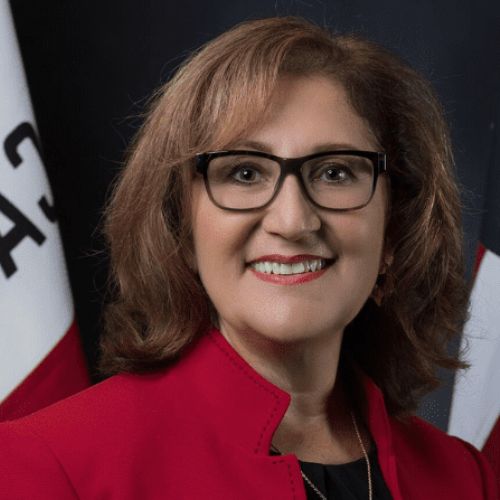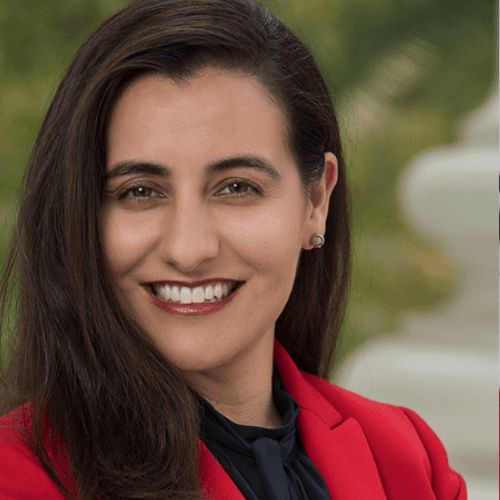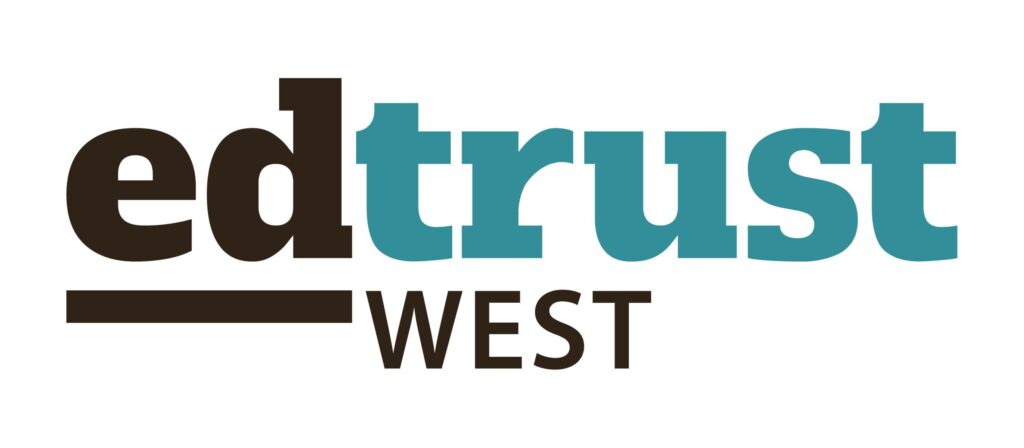Every spring, California legislators offer new ideas or proposed changes to programs and policies that touch the lives of California’s roughly 10 million students, from TK-12 to higher education. Many of these ideas stand to improve opportunity and access for students of color, students from lower-income communities, and multilingual learners – if decision-makers in Sacramento are encouraged to make them a reality.
That’s why each year, EdTrust-West analyzes proposals from the state budget and new legislation and identifies the top eight greatest opportunities to advance educational equity and justice.
Every spring, California legislators offer new ideas or proposed changes to programs and policies that touch the lives of California’s roughly 10 million students, from preschool to K-12 to higher education. Many of these ideas stand to improve opportunity and access for students of color, students from lower-income communities, and English learners – if decision-makers in Sacramento are encouraged to make them a reality.
That’s why each year, The EdTrust-West analyzes proposals for the state budget and new legislation and identifies the top eight greatest opportunities to advance educational equity and justice.
The Equity 8 for 2023
Last Updated: 11/1/2023
Local Control Funding Formula Accountability Improvements (Governor Newsom) (Omnibus K-12 Budget Trailer Bill) -
Every year, local educational agencies* (LEAs) are required to complete accountability plans (known as Local Control Accountability Plans or LCAPs) and adopt goals for meeting state priorities through their actions and expenditures. However, state law did not require LEAs to address disparities in student achievement.
The final 2023-2024 state budget included Governor Newsom’s LCFF accountability improvements and now requires LEAs to plan actions specific to student groups and schools receiving the lowest performance level on one or more indicators on the California School Dashboard. LEAs must also specify the actions and funding that they will use to achieve those goals.
The budget also designated two to four LEAs as “equity leads” to help other LEAs determine which programs and practices are most effective in meeting the needs of all students and addressing racial disparities.
Together, these changes will place greater emphasis on closing gaps in opportunity and achievement for low-income students of color.
Status: Enacted in the final California 2023-2024 State Budget. This is a big win!
* Local Educational Agencies (LEAs) are governmental entities responsible for operating public K-12 schools. They are most typically school districts, but can also include county offices of education, charter schools or charter school networks, or alternative schools.
Alternative Equity Multiplier (Black In School Coalition) –
Over the past few years, Assemblymember Shirley Weber and Assemblymember Akilah Weber have authored legislation to provide additional state funding to meet the educational needs of Black students.
In January 2023, Governor Newsom proposed an “equity multiplier” that would provide $300 million in additional funding to elementary and middle schools where 90% of the students are eligible for free meals and high schools where 85% of students are eligible. This funding would be added to money already provided through the Local Control Funding Formula.
Unfortunately, only 7%of Black students attend schools that would have received extra financial support from the equity multiplier.
The Black in School Coalition proposed an alternative that would have provided extra funding to LEAs according to student performance, a concept borrowed from AB 2774 (Weber), a popular bill tabled in 2022. According to estimates from the Black in School Coalition, 90% of the extra funding would have gone to LEAs for Black students and 10% for Native American students, based on the numbers of students in these groups.
In the final stages of the budget process, the Governor proposed changes to the equity multiplier and the legislature adopted them. The final equity multiplier provides $300 million to high-need schools identified according to “nonstability” in enrollment (a measure of continuous enrollment) and socioeconomic status. Socioeconomic status would be measured by parents’ high school graduation, eligibility for free or reduced-price meals, migrant status, homelessness, foster youth status, or attendance in a juvenile court school.
The percentage of Black students in schools eligible for funding from the final equity multiplier would likely increase from 7% in the original version to over 12% in the final. Although the final equity multiplier will provide extra funding for more Black students, more can and must be done to center Black students in the state’s funding policies.
Status: Failed, but final equity multiplier is improved.
AB 1106 (Soria) The EdTrust-West and Children Now-Sponsored Legislation to Implement PK-3 Early Childhood Education Specialist Credential –
EdTrust-West and Children Now co-sponsored AB 1106, which by establishes a one-time grant program that will provide financial support to colleges and universities so they can implement and offer both the PK-3 Early Childhood Education (ECE) Specialist Credential and give preference to programs that will simultaneously offer a bilingual authorization.
The new credential helps to meet workforce demands by providing an additional pathway into teaching, and students in transitional kindergarten through grade 3 will benefit from a workforce trained in child development-based pedagogy.
At the end of the legislative session, the Department of Finance opposed AB 1106, arguing it would cost between $5 million and $10 million and duplicate existing funding programs. EdTrust-West and Children Now decided to make AB 1106 a two-year bill and continue advocating for it in 2024.
Status: AB 1106 is a two-year bill and EdTrust-West and Children Now are advocating to have funding for it included in the 2024-25 state budget.
AB 393 (L. Rivas) Identification of Dual Language Learners in Childcare –
AB 393 will require the Department of Social Services (DSS) to develop procedures for identifying dual language learners in state childcare programs, including migrant care. The bill will also require the collection and reporting of data on home language, preferred language, race/ethnicity, language characteristics of the program, and language composition of program staff.
AB 393 will make it possible to plan and implement services to meet the needs of dual language learners in state childcare programs.
Status: Governor Newsom signed AB 393 (L. Rivas) on October 8th. This is a big win!


AB 596 (Reyes) and SB 380 (Limon) Childcare and Preschool Reimbursement Rate Reform –
Historically, the state has calculated the amount of funds to reimburse providers of subsidized childcare using two types of provider rates: the Regional Market Rate (RMR) and the Standard Reimbursement Rate (SRR). The RMR varies based on the county in which the child is served and is based on regional market surveys of a sample of licensed childcare providers. The SRR is the same rate for providers across the state. The differences in rates result in pay disparities between regions and care settings as well as unstable income for providers, most of whom are women of color.
AB 596 and SB 380 will help both early learning and childcare providers and families by transitioning providers to a single cost-based reimbursement rate, suspending family fees until an equitable sliding scale for family fees is established, and funding providers according to enrollment rather than attendance. These bills will ensure that providers are being paid for the true cost of care.
The final 2023-2024 state budget included several big wins related to these bills. The budget included the following: $29.4 million to waive family fees through September 30, 2023; $56 million to revise the family fee schedule to limit fees to 1% of families’ monthly income and prohibit fee assessment for families with an adjusted monthly income below 75% of State Median Income; forgiveness of pre-pandemic family fee debt; $22 million to continue hold harmless policies for providers until September 30, 2023; and $2.8 billion to provide rate reimbursements to providers over a two-year period. The rate increase is subject to a ratified agreement with the Child Care Providers Union (CCPU).
While we consider these steps big wins towards stabilizing the childcare field, we look forward to continuing to work with the Governor and his staff to implement a new rate structure that aims to pay providers wages that reflect the true cost of care.
Status: SB 380 is pending in the Assembly Appropriations Committee, and AB 596 is pending in the Senate Appropriations Committee. Both are now two-year bills. However, EdTrust-West considers these wins due to the funding received in the budget that will be used to achieve the policy goals of the bills. Work on this issue is a big win!
AB 714 (McCarty) Guidance on Newcomers –
In the 2020-21 school year, California enrolled nearly 152,000 newcomer students, those who have attended schools in the U.S. for fewer than three years. Many schools throughout the state struggle to offer the specialized instruction and support these students need to be successful in school.
AB 714 will require the California Department of Education (CDE) and the Department of Social Services (DSS) to curate and maintain information and best practices to help LEAs support newcomer students. The bill also requires the CDE to post newcomer enrollment on its website, while the Instructional Quality Commission will be required to consider curriculum and resources to support newcomer students when revising the curriculum framework in English Language Arts/English Language Development.
AB 714 will ensure that researchers, policymakers, and educators all have data and information to help newcomer students get the instruction and support they need to succeed.
Status: Governor Newsom signed AB 714 (McCarty) on October 7th. This is a big win!
AB 368 (Holden) The EdTrust-West and Hispanas Organized for Political Equality Co-Sponsor Further Improvements on Dual Enrollment –
AB 368, which builds on important recent state investments in dual enrollment.
AB 368 further refines College and Career Access Pathways (CCAP) agreements. These agreements between a community college district and an LEA establish dual enrollment programs that allow high school students to take college-level coursework either at their high school or local community college.
It will require community college districts participating in a CCAP agreement to give CCAP high school students priority in course registration. The bill will also exempt all students participating in dual enrollment through CCAP agreements from paying fees.
AB 368 also defines the target population for dual enrollment as groups “underrepresented in higher education,” naming specific groups that have historically been marginalized by the education system such as low-income students, student parents, undocumented students, students with disabilities, and others.
Dual enrollment programs are proven to improve students’ chances of going to and succeeding in college
Status: Governor Newsom signed AB 368 (Holden) on October 8th. This is a big win!
Successfully Opposed 2023 Bills
In addition to helping craft, supporting, and advocating for bills that advance racial equity, we occasionally choose to oppose bills that threaten it. This year, we led the fight against two concerning bills—and successfully defeated both.
AB 638 (McCarty) and a Proposed Budget Trailer Bill Decentering English Learners, Low-Income or Foster Youth’s Needs in the Golden State Teacher Program – The Golden State Teacher Grant (GSTP) program is designed to alleviate the TK-12 teacher shortage and its inequities by offering financial relief to future teachers. The program awards up to $20,000 in grants to college students enrolled in teacher preparation programs in exchange for a commitment to teach for four years in a “high-need” school. In existing law, “high-need school” is defined as a school where 55% or more of the students are English learners, low-income or foster youth.
AB 638 and a budget trailer bill proposed by the Department of Finance would have permitted GSTP recipients to fulfill the teaching service requirement in any public school, rather than a “high-need” school.
However, the teacher shortage does not affect all schools equally. High-quality teachers are one of the most important factors to student success, yet low-income students of color often have the least access to high-quality teachers.
EdTrust-West worked hard to oppose AB 638 and the proposed budget trailer bill because California’s teacher shortage is a racial equity issue; these proposals would have exacerbated the uneven access to high-quality teachers that is a major barrier to success for low-income students of color.
Status: AB 638 was held in the Assembly Appropriations Committee and the Department of Finance dropped the proposed budget trailer bill. This is a big win!
AB 811 (Fong) Financial Incentives for Community Colleges to Encourage Unnecessary and Ineffective Course Retakes –
The educational goals of too many low-income community college students of color have been delayed or ended altogether by coursework that does not count for credit. Over the past several years, thanks to previous Equity 8 legislative wins (AB 705 and AB 1705), community colleges have been making progress towards equitable access and completion of transfer-level courses.
AB 811 would have required colleges to allow students to retake courses – including English as a Second Language (ESL) courses – up to two times, even when the student has already successfully completed the course. Under this proposed legislation, colleges would have received funding for those course retakes, creating a powerful monetary incentive that conflicts with the best interests of students.
There is no evidence showing that retaking a course after passing it improves student success or enhances learning. In fact, for the roughly 80% of community college students who intend to transfer, taking additional courses unnecessarily can prolong their efforts to earn transfer credit and lead to greater attrition. What’s more, retaking courses adds to the cost of college, sucking up limited financial aid resources and increasing the likelihood of student debt for a population already disproportionately burdened.
In response, EdTrust-West led a coalition of educational justice organizations in opposition, rallying advocates across the state to urge lawmakers not to pass AB 811.
Status: Governor Newsom vetoed AB 811 (Fong) on October 8th. This is a big win!

